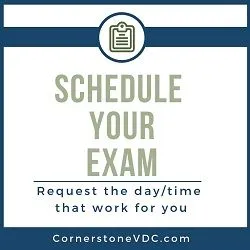Vision Testing - Frequently Asked Questions
Who should get tested?
Early Detection: We recommend that all children begin vision testing at least at the ages of 6 months, 3 years (prior to preschool entry) and at age 5 (the summer before kindergarten). Early diagnosis of problems like amblyopia (i.e., lazy eye), convergence insufficiency (a near vision disorder), and other problems can help children avoid compounding other challenges they may already face (e.g., dyslexia, ADD, etc.).
Struggling Readers: 1-in-4 students struggling to read or in school have an undiagnosed vision problem. If your child is struggling to read, a full vision exam can uncover any hidden vision deficits that are holding them back.
Eye Health Problems: Adults should also have annual vision testing to catch problems like hypertension, glaucoma, diabetes, cataracts early, when treatment is more effective.
Traumatic Brain Injury: Our vision tests can assess and develop treatment plans for all ages of people struggling with vision problems due to traumatic brain injuries, autism, whiplash and eye strain from computer usage or reading.
Is there a difference between Cornerstone's full vision testing and my normal checkup?
Yes! Your typical vision exam only tests for vision acuity (20/20 vision) and eye health. However, there are many more eye skills that affect reading, computer work, and daily life that are NOT tested during typical checkup and school vision screenings. Our full vision exam tests eye movements, eye coordination, balance and movement, and visual information processing. Request an appointment.
Is testing invasive or difficult?
No! Our full vision exam does not require dilation or an invasive testing. Part 1 of our testing is completed in the optometrist exam room and utilizes non-invasive equipment. Part 2 of our testing is completed by our vision therapists and tests eye coordination, eye movement, vision/reading, and visual information processing skills.
Am I committed to vision therapy after testing?
No! Our full testing will diagnosis any vision problem or developmental deficits. The doctor may recommend vision therapy at the follow-up appointment, but it is your choice to decide to start therapy.
Can vision testing and therapy help with reading problems?
Yes! Learning to read is complex skill, but reading starts with the input and processing of visual information. Basically, if your child's eyes are NOT working correctly, reading may be exhausting, slow, or seem impossible. Vision testing can identify hidden vision problems that limit reading ability. We have seen incredible success helping our patients improve their reading abilities, test scores, and reading enjoyment after vision therapy has trained their eyes to see clearly, easily. Learn more about vision therapy & reading.
How much does vision testing cost?
We provide the cost of testing over the phone when you schedule your appointment. To provide an exact price for testing for your or your child, please email our staff, and we will followup with specific pricing and appointment details. Contact us for pricing and payment options.
Why is a full vision testing important?
Full vision testing is vital because good vision is more than 20/20 acuity, but that's that all typical eye exams look for. Comfortable reading requires your visual system to utilize over 20 different eye skills. Many learning difficulties can be attributed to vision problems that are not detected during typical school vision screenings. Some of the most common disorders we diagnose concern:
- Eye movements (tracking side to side)
- Accommodation (eyes focused so vision is clear)
- Binocular disorders (eyes working as a team)
- Depth perception
- Visual processing and memory
- Visual motor integration
Schedule Your Full Vision Exam
Our comprehensive exam can reveal hidden vision problems behind frequent headaches, reading/writing struggles, and blurred or double vision. We want to help you see better so you can live better.
We will test for eye health, acuity (ability to focus at a distance), convergence (ability to turn eyes together), eye pursuits/saccades (eye movement ability), accommodation (ability to make vision clear), and visual processing (the connection between the visual system and the brain).

